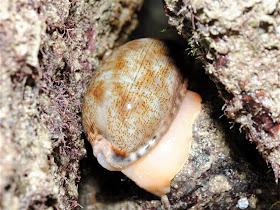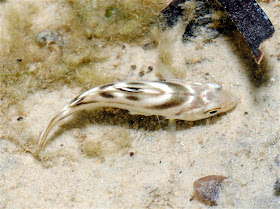The waters are rather deep in the lagoon and there were quite a number of marine critters swimming around such as this tiny and cute squid!
This Pygmy squid (Idiosepius sp.) is commonly seen on many of our shores, among seagrasses and near reefs and rubble.
There were also many of these Penaeid prawns (Family Penaeidae) from small to large scurrying by the edge of the lagoon.
A pleasant surprise for this shore would be the numerous Common sea stars (Archaster typicus) found along one stretch of the lagoon.
Here is a pair in mating position. Usually, the male would secure the female in this position by interlocking their arms with the partner's arms. Then they go about doing their action of releasing sperms and eggs into the water.
It was rather unexpected for me to see this reefy flatworm on the sandy shores! This flatworm looks similar to the Dawn flatworm (Pseudobiceros uniarborensis) but it has a black edge instead of the usual white edge. Not too sure what the identity of this critter is.
On the higher shore, there are quite a number of these Oysters (Family Ostreidae) with some of the Nerite snails (Family Neritidae).
Deeper in the waters of the lagoon, it is rather bare but sometimes one can encounter colonies of sponge such as this.
The large lagoon has one tiny outlet that leads to the sea so when the tide is receding, the current within this outlet is quite strong. Nevertheless, some reefy animals such as this Disk coral (Turbinaria sp.) can be found.
I came across three of these Red egg crabs (Atergatis integerrimus) among the strong currents.
The others who were at Lazarus Island came across the juvenile version of the floral crab! So this is how the red egg crab should look like when they are young.
This Velcro crab (Camposcia retusa) demonstrates camouflage by allowing sponges and other encrusting organisms to live with it so that it will not be easily picked up by the predators.
Also found by the team at Lazarus will be this endangered Chiton (Acanthopleura gemmata)! Most of them hard to spot and they tend to cling on tenaciously to rocks.
As there were some time left, Ivan and I went back to the usual man made lagoon to have a check on the health of the shore.
It was wonderful to find the Arabian cowrie (Cypraea arabica) wedged in between two huge boulders on the sea wall. This cowrie is rather huge as compared to the more common ones we see on our shores.
Not the first time seeing them on this shore, there were plenty of Starry flatworms (Pseudobiceros stellae)!
This fish with curved stripes is aptly named as the Crescent perch (Terapon jarbua)!
There are also a number of these Pink moon snails (Natica zonalis) found active on the shore in the dark before sunrise. Some of these snails have some patterns on their shells.
This washed up White sea urchins (Salmacis sp.) might be a first record for this shore!
Ivan found a sea cucumber that looks like the Remarkable sea cucumber (Holothuria notabilis). Amn not too sure if it is exactly one as it looked a little different.
In the deeper waters of the lagoon before the tide came back, a special sighting for me would be this Fire anemone (Actinodendron sp.)! Usually found on natural reefs, it sure is surprising to know how these animals can colonize artificial shores.
Before leaving, I couldn't resist but to walk to the other end to have a look at these pretty Dubious nerites (Clithon oualaniensis) that dot the shore. These snails made me imagine how God could have used a fine-lined marker to draw intricate patterns on their shell.
As we enjoyed the sunrise, it was time to head back to the departure point. Ivan and I couldn't resist not taking photos of the pretty sunrise.
While waiting for the Lazarus team to return, I noticed lots of hard corals and gianormous Long spined black sea urchins (Diadema sp.) by the side of the vertical sea wall. There was even a batfish swimming nearby!
Going down to the floating pontoon, I submerged my UW camera and captured a shot of yet another of the batfish. This is the young version of the batfish.
As usual, the pretty sea fans and soft corals are still there hiding at the dark corners of underneath the pontoon.
Here's another view of the underside of the pontoon with huge growths of sea fans!
Among the soft corals and algae that grow by the sides of the pontoon, there are also sea cucumbers which can be spotted by their feeding tentacles.
I also spent some time watching the cats climb up and down...
and play with each other.
How nice to spend the saturday morning of the long Hari Raya weekend on the island! We would probably only visit this shore again next year.





























No comments:
Post a Comment